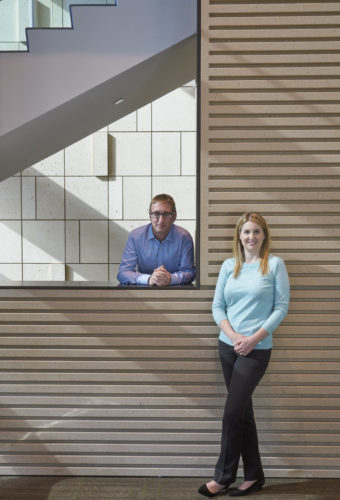Colleen Honigsberg : Assistant Professor of Law

While in college at UCLA, Colleen Honigsberg planned to go to medical school someday. But while working at an economic consulting firm after graduation, she often crossed paths with law professors who served as expert witnesses. “They were the happiest people I’d ever met,”Honigsberg recalls. “Their work was different every day. If something piqued their interest while reading the newspaper, they could research it.”
She shifted gears and enrolled at Columbia Law School, planning to start out at a big firm after graduation. But during her third year, she found herself enamored with corporate and securities law and its interplay with empirical analysis. “I loved analyzing how court decisions affected financial markets. I wanted to understand the policy implications of these changes in corporate and securities laws.” Plus, she couldn’t get those happy law professors out of her head. So, she decided to pursue academia, staying at Columbia to earn a PhD in accounting. “My mom is still befuddled how someone could get a PhD in bookkeeping,” she quips.
At Columbia, Honigsberg approached Professor Robert Jackson about being an academic, which he strongly supported. Honigsberg “immediately stood out even among a strong group of law students,” Jackson says. “She didn’t just learn the material to do well on an exam. She wanted nothing less than complete understanding.”
Honigsberg’s merging of the disciplines of law and accounting has the potential for “great and important impact,” Jackson adds. “Ask any CEO who they deal most with every day and they’ll tell you accountants. But very few accountants have become law professors. Colleen is a vanguard in opening up this space. She’s a very exciting young scholar with an extraordinary future.”
Honigsberg’s new colleagues at Stanford Law School are equally enthusiastic. “We are thrilled to welcome Colleen to our faculty,” says Joseph Grundfest, JD ’78, W. A. Franke Professor of Law and Business. “Colleen promises to be a dynamic classroom presence and a cutting-edge scholar with the ability to meld advanced statistical techniques, sophisticated appreciation of the legal regime, and serious accounting knowledge. The sky really is the limit for a young faculty member with such an advanced and eclectic skill set.”
So far, Hongisberg has empirically analyzed the effects of usury laws on consumer loans; how laws making it harder for private litigants to bring cases against auditors result in a drop in audit quality; and the positive effects of hedge fund regulation. Although her work is largely focused on corporate and securities laws, Honigsberg interprets the intersection of law and accounting broadly. Indeed, some of her current research delves into the dark web. “After marijuana is legalized, do dark web sales increase because people go online to avoid taxes?” she asks.
Already Honigsberg’s scholarly work has been featured in The Economist, The Wall Street Journal, and The New York Times. But she also excels at the teaching end of academia. “Students adore Colleen,” Jackson says. “Many great researchers are subject-matter experts but may not care as much about the student experience. As a scholar and a human, Colleen is very curious about the minds of people around her. She’s a natural teacher.” She will be teaching Corporations this year.
A Berkeley native, Honigsberg describes herself as outdoorsy. During college breaks, she worked at a fly-fishing lodge in remote Alaska and at a white-water rafting company in South Carolina. She and her husband, a former investment banker, vacation in places like Iceland, Tasmania, and the Galapagos. They live off Sand Hill Road, allowing Honigsberg to bike to work.
Fabrizio Ferri, a business accounting professor at Columbia Business School, served as Honigsberg’s PhD advisor. He describes her as a “highly energetic scholar” who’s always looking for new research ideas. “She combines cutting-edge methodology with very important policy questions. Her work is both rigorous and relevant,” Ferri says. “She’s also a very strong communicator, which is not that common in accounting and finance. She has the whole package—intellectual brainpower plus communication and soft skills—which makes her a very effective teacher. It’s not surprising that she ended up as a law professor at one of the best schools in the country.”
